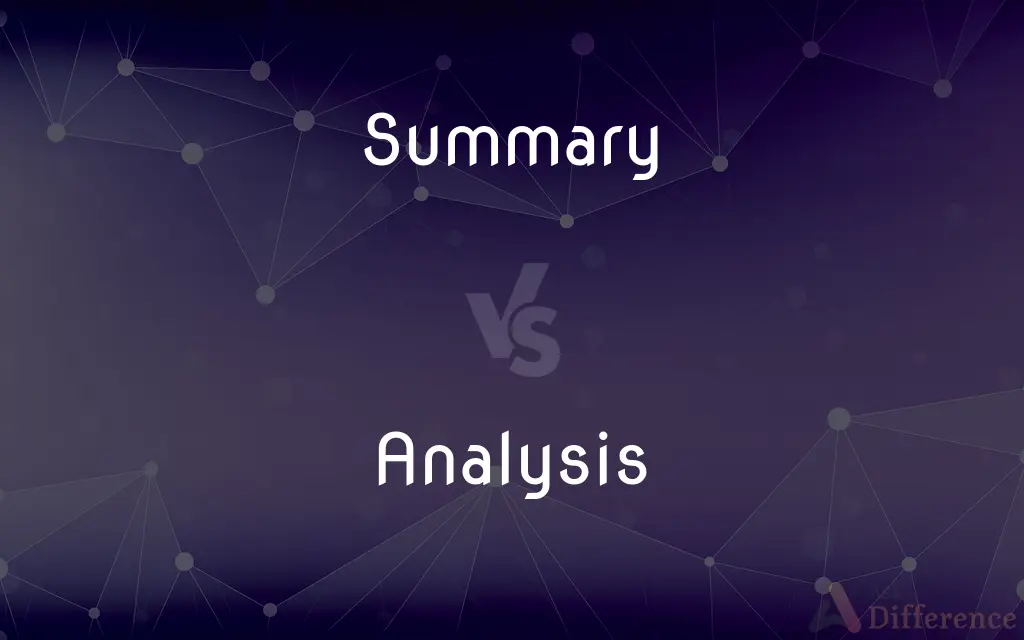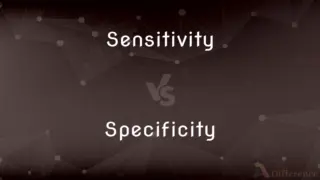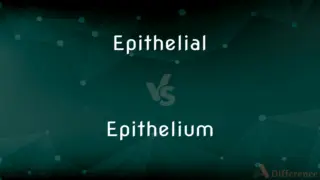Summary vs. Analysis — What's the Difference?

Difference Between Summary and Analysis
ADVERTISEMENT
Compare with Definitions
Summary
A brief statement mentioning the main points of something
A summary of our findings.
Analysis
Analysis is the process of breaking a complex topic or substance into smaller parts in order to gain a better understanding of it. The technique has been applied in the study of mathematics and logic since before Aristotle (384–322 B.C.), though analysis as a formal concept is a relatively recent development.The word comes from the Ancient Greek ἀνάλυσις (analysis, "a breaking-up" or "an untying;" from ana- "up, throughout" and lysis "a loosening").
Summary
Prose that provides information in a condensed format, as by mentioning only the most significant details of a narrative
The novelist did not like writing dialogue and preferred to write stories in summary.
Analysis
Detailed examination of the elements or structure of something
Statistical analysis
An analysis of popular culture
Summary
Presenting the substance in a condensed form; concise
A summary review.
ADVERTISEMENT
Analysis
Short for psychoanalysis
Other schools of analysis have evolved out of the original disciplines established by Freud
Summary
Performed speedily and without ceremony
Summary justice.
A summary rejection.
Analysis
The separation of an intellectual or material whole into its constituent parts for individual study.
Summary
Concise, brief or presented in a condensed form
A summary review is in the appendix.
Analysis
The study of such constituent parts and their interrelationships in making up a whole.
Summary
Performed speedily and without formal ceremony.
They used summary executions to break the resistance of the people.
Analysis
A spoken or written presentation of such study
Published an analysis of poetic meter.
Summary
(legal) Performed by skipping the procedures of a standard and fair trial.
Summary justice is bad justice.
Analysis
The separation of a substance into its constituent elements to determine either their nature (qualitative analysis) or their proportions (quantitative analysis).
Summary
An abstract or a condensed presentation of the substance of a body of material.
Make a summary of the events
Analysis
The stated findings of such a separation or determination.
Summary
Formed into a sum; summed up; reduced into a narrow compass, or into few words; short; brief; concise; compendious; as, a summary statement of facts.
Analysis
A branch of mathematics principally involving differential and integral calculus, sequences, and series and concerned with limits and convergence.
Summary
Hence, rapidly performed; quickly executed; as, a summary process; to take summary vengeance.
Analysis
The method of proof in which a known truth is sought as a consequence of a series of deductions from that which is the thing to be proved.
Summary
A general or comprehensive statement; an abridged account; an abstract, abridgment, or compendium, containing the sum or substance of a fuller account.
Analysis
(Linguistics) The use of function words such as prepositions, pronouns, or auxiliary verbs instead of inflectional endings to express a grammatical relationship; for example, the cover of the dictionary instead of the dictionary's cover.
Summary
A briefstatement that presents the main points in a concise form;
He gave a summary of the conclusions
Analysis
Psychoanalysis.
Summary
Performed speedily and without formality;
A summary execution
Summary justice
Analysis
Systems analysis.
Summary
Briefly giving the gist of something;
A short and compendious book
A compact style is brief and pithy
Succinct comparisons
A summary formulation of a wide-ranging subject
Analysis
(countable) Decomposition into components in order to study (a complex thing, concept, theory etc.).
Analysis
(countable) The result of such a process.
Analysis
The mathematical study of functions, sequences, series, limits, derivatives and integrals.
Mathematical analysis
Analysis
Proof by deduction from known truths.
Analysis
The process of breaking down a substance into its constituent parts, or the result of this process.
Analysis
The analytical study of melodies, harmonies, sequences, repetitions, variations, quotations, juxtapositions, and surprises.
Analysis
Psychoanalysis.
Analysis
A resolution of anything, whether an object of the senses or of the intellect, into its constituent or original elements; an examination of the component parts of a subject, each separately, as the words which compose a sentence, the tones of a tune, or the simple propositions which enter into an argument. It is opposed to synthesis.
Analysis
The separation of a compound substance, by chemical processes, into its constituents, with a view to ascertain either (a) what elements it contains, or (b) how much of each element is present. The former is called qualitative, and the latter quantitative analysis.
Analysis
The tracing of things to their source, and the resolving of knowledge into its original principles.
Analysis
The resolving of problems by reducing the conditions that are in them to equations.
Analysis
A syllabus, or table of the principal heads of a discourse, disposed in their natural order.
Analysis
The process of ascertaining the name of a species, or its place in a system of classification, by means of an analytical table or key.
Analysis
An investigation of the component parts of a whole and their relations in making up the whole
Analysis
The abstract separation of a whole into its constituent parts in order to study the parts and their relations
Analysis
A form of literary criticism in which the structure of a piece of writing is analyzed
Analysis
The use of closed-class words instead of inflections: e.g., `the father of the bride' instead of `the bride's father'
Analysis
A branch of mathematics involving calculus and the theory of limits; sequences and series and integration and differentiation
Analysis
A set of techniques for exploring underlying motives and a method of treating various mental disorders; based on the theories of Sigmund Freud;
His physician recommended psychoanalysis
Share Your Discovery

Previous Comparison
Sensitivity vs. Specificity
Next Comparison
Epithelial vs. Epithelium













































